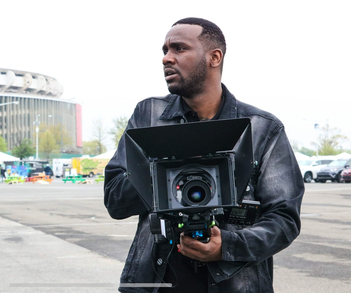Trey Carswell is the founder of Moon’k Films Devoted, a global independent film company established in 2015. A graduate of Howard University with a Bachelor’s Degree in political science and economics, and a Master’s in international relations & public administration and policy, his love for acting and filmmaking drove him to career in production instead of politics. He spoke by email with TNJ contributing writer Taroue Brooks about the company and its work, and how he stays motivated.
Tell us about Moon’k Films Devoted
Moon’k Films Devoted is comprised of a team of experts in television and movie/film production, and it has worked on projects across the U.S. and internationally. We have received congressional awards and have even been featured in The Nation’s Capital business journal as one of the top 25 production companies and one of the top 25 business leading companies.
As a National Minority Business Enterprise (NMBE) certified business, we have premiered several full-length feature films, documentaries, film shorts, and promotional visuals across the U.S. and received outstanding reviews for our cinematic, storyline, and presentation.

What inspired you to become an entrepreneur?
I realized I would be an entrepreneur after I completed my master’s degree at Howard University. I thrived in school and I am so proud of what I accomplished with my academics, but my true passion comes from expressing my creative genius. Becoming the best actor I can be, the best producer or director— these aren’t dreams I can chase by following in someone else’s footsteps. I had to create my own path.
My inspiration to build this company—my motivation to do any and everything I do—comes from my daughter Nia. She gives me the energy and drive to keep going when I start to feel like slowing down. She makes every victory taste that much sweeter. My devotion to my daughters is the very motto that fuels my company.
How important is it for African Americans to tell our stories?
It is essential for African Americans to tell our own stories because these narratives reflect the richness, diversity, and complexity of our experiences. By controlling the lens through which our stories are told, African Americans can break stereotypes, preserve cultural heritage, and inspire future generations. Telling authentic stories empowers communities, reshapes perspectives, and ensures their voices are heard and valued in a world where representation matters more than ever.
What is the untold story in your film, “The Shot?”
I created “he Shot” because I wanted to tell a story that has been overlooked for more than a half-century. We are approaching the 56th Anniversary of the assassination of the Rev. Dr. Martin Luther King Jr., and it has always baffled me that Dr. King’s accused assassin, James Earl Ray, a man with a record of petty crimes and a man who did not seem very intelligent, pulled off such a heinous crime of assignation that will go down in American history.
Most of us are aware of the key figures that witnessed the horrible assassination, like Ralph David Abernathy, Jesse Jackson, and Andrew Young. I found it very intriguing to learn about the young South African photographer, Joseph Louw, who was with Dr. King and had been in his company for some time while he was doing a documentary on Dr. King. So I took my frustration about who I believe was just a fall guy in Dr. King’s assassination, and chose to tell the story of the humble young photographer behind the camera. Through all of these things, I created ‘The Shot.’
The story line is this: After an apartheid-fueled controversy forces him to leave his South African home, photographer Joseph Louw sets out to document the travels of civil rights pioneer Dr. Martin Luther King Jr. Little did he know that he would be capturing some of the final moments of King’s life. April 4th, 1968, just minutes after King’s horrifying assassination, chaos ensues, but Louw has enough clarity to capture a moment in time that would end up being a monumental moment in history.
How do you stay motivated in such a competitive industry?
Staying motivated in a highly competitive industry like filmmaking requires a deep passion for storytelling and a clear sense of purpose. Filmmakers must constantly remind themselves why they started, focusing on their unique voice and vision, which sets them apart from others. Building a strong support network of like-minded creatives and mentors can provide encouragement and perspective during challenging times.
It’s important to celebrate small victories and milestones, as these keep the momentum going when larger successes seem far off. Embracing failure as part of the learning process helps in maintaining resilience and adaptability in a field that is often unpredictable. Consistent self-improvement, through learning new skills or refining one’s craft, ensures that a filmmaker remains competitive and ready for new opportunities. Lastly, staying inspired by the work of others, while avoiding comparison, can reignite the creative spark and remind filmmakers of the infinite possibilities the industry holds.
